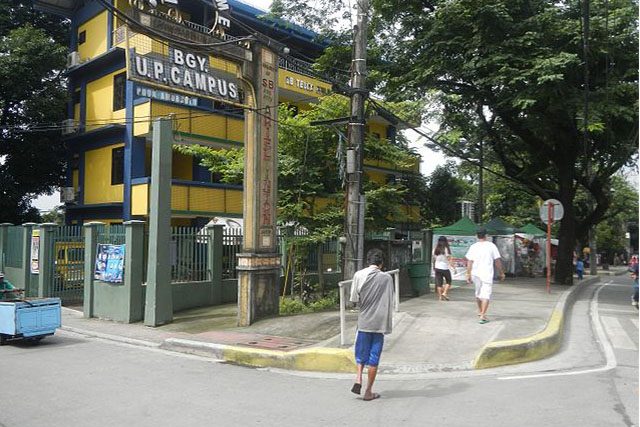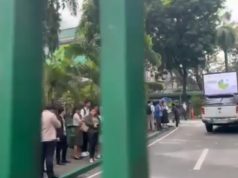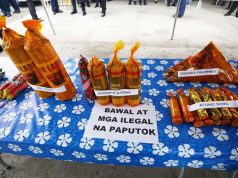
The Philippine National Police released a statement declaring Barangay UP Campus a crime hotspot all of a sudden as the university is seeking to discuss with the Department of National Defense its unilateral junking of their 1989 accord to keep police and military outside the campus.
PNP Public Information Office said the jurisdiction covering much of the grounds belonging to the University of the Philippines Diliman ranked 20th in the peace and order indicator of Quezon City since 2016. The city has a total of 142 barangays.
Brgy. UP Campus also covers eight barangays in the city—UP Campus, Krus na Ligas, San Vicente, Botocan, Culiat, Old Capitol Site, Pansol and Vasra.
The PNP claimed that in the last five years, the barangay had a total of 250 drug-related cases, 106 theft, 72 robberies, 36 physical injuries, 21 rape, 14 murder, 23 carnapping and two complex crime cases of robbery with homicide
Non-index crimes were also recorded, such as two illegal gambling, 21 malicious mischiefs, 43 VAWC (violence against women and children), four direct assault, three forcible abductions, 14 homicide, five acts of lasciviousness, 13 estafa, 43 child abuse, 11 public health violations and two obstructions of justice.
Meanwhile, the timing of the statement about Brgy. UP Campus was questioned online, perceiving it as an attempt to justify the termination of the UP-DND Accord.
“Ayos ng timing,” a Twitter user said sarcastically in response to the reports.
Journalist Jervis Manahan, who has been covering Quezon City for years, likewise questioned the release of the report and commented that crime was “more rampant in barangays with higher poverty rates.”
So apparently, PNP-PIO released a statement saying Brgy. UP Campus is a QC crime hotspot.
This is an obvious attempt to justify the abrogation of the UP-DND accord.
I've been covering QC for a few years now and crime is more rampant in brgy's with higher poverty rates. (1/n)
— Jervis Manahan (@JervisManahan) January 21, 2021
“The timing of the statement is also questionable. Why even nitpick on Brgy. UP Campus? Why don’t we release the full data of crimes happening in the entire city?” Manahan added in the replies thread of his post.
The Quezon City Police Department in 2015 and 2018 released lists of “crime-prone barangays” which did not include Brgy. UP Campus on either occasion.
And in 2015, QC police also released a list of crime prone barangays in the city.
In both lists (2015 and 2018), Brgy. UP Campus was not included in the list. pic.twitter.com/IDsU0oJ5xZ
— Jervis Manahan (@JervisManahan) January 21, 2021
Other Twitter users, who claimed to be residents of the particular barangay, commented that they “never experienced” serious crimes in their lifetime.
“I’ve been living in and going around Brgy. UP Campus since December 2013 and have never experienced or seen any crime except the rare petty theft that happened to a neighbor and the usual plant-poaching. It’s even safe to walk at late hours. Crime hotspot?!” wrote an online user.
“My family has been (a) resident of the barangay for 14 years now, and my older brother for almost 40 years. I work GY (graveyard) shifts and as commute is only available up to 11 PM, I have to walk out of the campus and (it) has always been safe,” commented another Twitter user.
Termination of the UP-DND Accord
Earlier this week, the Department of Defense alleged the state university has become a breeding ground of communist rebels as it wrote a letter to the university president to end the 1989 DND-UP accord.
RELATED: Throwback to ’70s: Diliman Commune remembered as UP-DND accord gets scrapped
UP President Danilo Concepcion called the move “unnecessary and unwarranted” and said that it has been terminated without their consultation.
On top of this, the military also presented a hypothetical situation about discovering a meth lab inside the state university in a bid to justify the abrogation.
The UP-Diliman Institute of Chemistry and the UPD Department of Chemical Engineering have both denied the suggestion.
The UP-DND Accord is a decades-long agreement between the institution and the defense department prohibiting the military and the police from entering its campuses, except in cases when university officials have allowed the entry, in hot pursuit and other similar emergencies.
It was made to protect the autonomy of the university from military intervention, especially in protests where students exercise their constitutional right to free speech as enjoyed in democratic societies.
UP is known for fostering ideals of academic excellence, patriotism and critical thinking.









